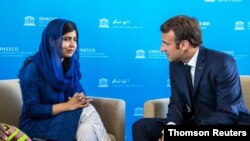PARIS — France wants the world’s leading industrial economies to double funding for girls' education in the Sahel at a summit next month in the French town of Biarritz.
Speaking Friday in Paris at the headquarters of the U.N. Educational, Scientific and Cultural Organization, French President Emmanuel Macron laid out initiatives to increase educational and economic opportunities for women, with a special focus on Africa's Sahel region.
Macron, whose country currently holds the presidency of the Group of Seven advanced economies, challenged fellow G-7 members to not only increase their financial commitment to girls’ education in the Sahel but also to make sure funds are spent efficiently and make a difference.
Macron also denounced anyone seeking to deny girls an education, including on religious grounds. Keeping girls at home, he said, was a form of modern slavery.
Fighting inequality
The French president spoke at the end of a two-day meeting that brought together development and education ministers from G-7 nations under the broader theme of fighting inequality, which is the goal of France's G-7 presidency.
UNESCO's director general, Audrey Azoulay, said that while gender parity in education is increasing worldwide, it’s lagging in some places, including conflict zones. In some of the poorest parts of sub-Saharan Africa, she said, only 30 girls for every 100 boys finished their secondary education between 2013 and 2017.
Nobel peace laureate and Pakistani rights activist Malala Yousafzai also called on G-7 members to increase funding for girls' education in developing countries, especially in Africa.
"Right now, there is not enough getting done,” she said. “Just 10 percent of your aid goes to countries where girls face the biggest challenges."
She said educating girls could add up to $30 trillion to the global economy, and she urged G-7 members to guarantee girls worldwide have access to at least 12 years of schooling.




